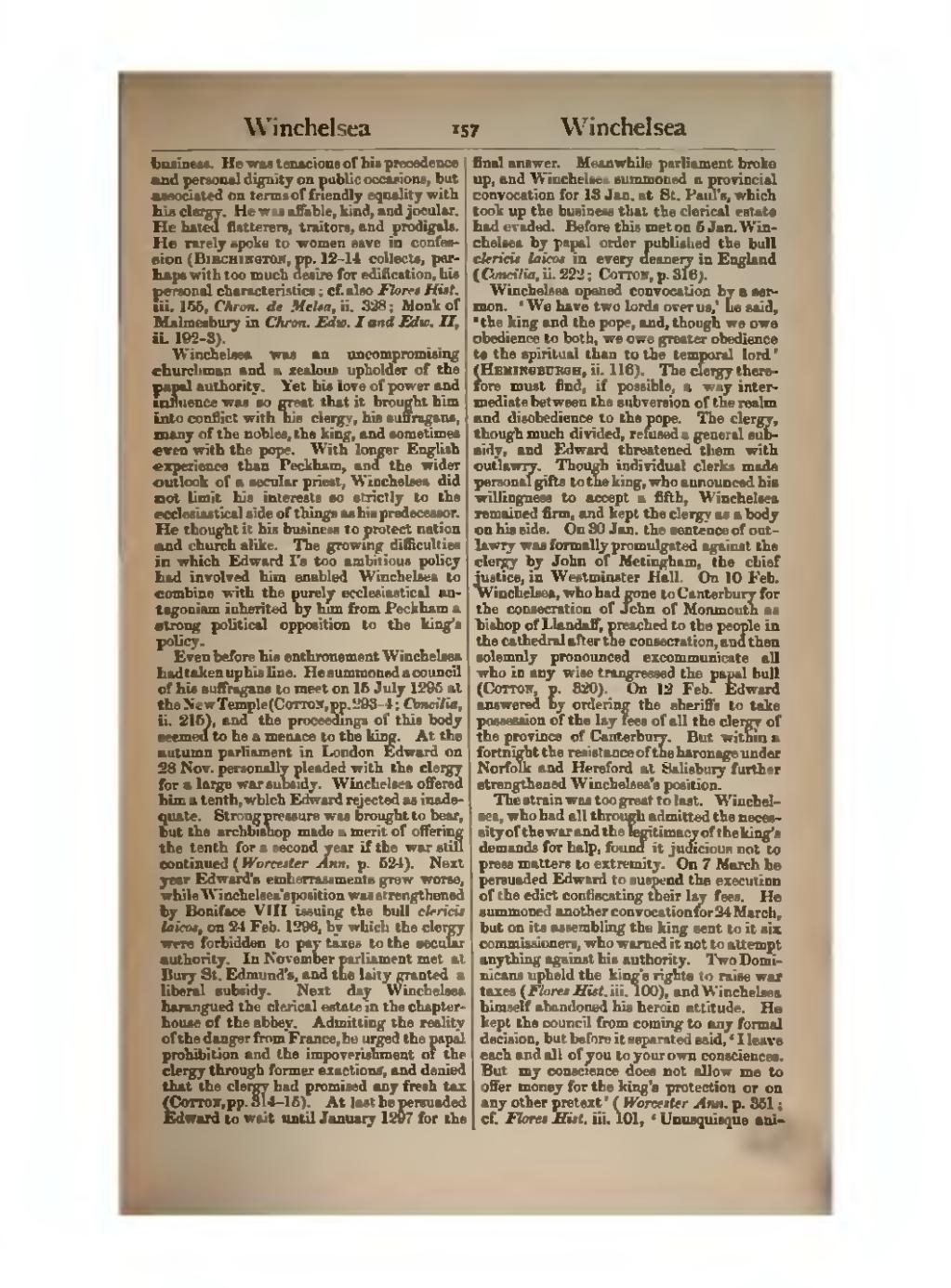business. He was tenacious of his precedence and personal dignity on public occasions, but associated on terms of friendly equality with his clergy. He was affable, kind, and jocular. He hated flatterers, traitors, and prodigals. He rarely spoke to women save in confession ({sc|Birchington}}, pp. 12–14 collects, perhaps with too much desire for edification, his personal characteristics; cf. also Flores Hist. iii. 155, Chron. de Melsa, ii. 328; Monk of Malmesbury in Chron. Edw. I and Edw. II, ii. 192–3).
Winchelsea was an uncompromising churchman and a zealous upholder of the papal authority. Yet his love of power and influence was so great that it brought him into conflict with his clergy, his suffragans, many of the nobles, the king, and sometimes even with the pope. With longer English experience than Peckham, and the wider outlook of a secular priest, Winchelsea did not limit his interests so strictly to the ecclesiastical side of things as his predecessor. He thought it his business to protect nation and church alike. The growing difficulties in which Edward I's too ambitious policy had involved him enabled Winchelsea to combine with the purely ecclesiastical antagonism inherited by him from Peckham a strong political opposition to the king's policy.
Even before his enthronement Winchelsea had taken up his line. He summoned a council of his suffragans to meet on 15 July 1295 at the New Temple (Cotton, pp. 293–4; Concilia, ii. 215), and the proceedings of this body seemed to be a menace to the king. At the autumn parliament in London Edward on 28 Nov. personally pleaded with the clergy for a large war subsidy. Winchelsea offered him a tenth, which Edward rejected as inadequate. Strong pressure was brought to bear, but the archbishop made a merit of offering the tenth for a second year if the war still continued (Worcester Ann. p. 524). Next year Edward's embarrassments grew worse, while Winchelsea's position was strengthened by Boniface VIII issuing the bull clericis laicos, on 24 Feb. 1296, by which the clergy were forbidden to pay taxes to the secular authority. In November parliament met at Bury St. Edmund's, and the laity granted a liberal subsidy. Next day Winchelsea harangued the clerical estate in the chapter-house of the abbey. Admitting the reality of the danger from France, he urged the papal prohibition and the impoverishment of the clergy through former exactions, and denied that the clergy had promised any fresh tax (Cotton, pp. 314–15). At last he persuaded Edward to wait until January 1297 for the final answer. Meanwhile parliament broke up, and Winchelsea summoned a provincial convocation for 13 Jan. at St. Paul's, which took up the business that the clerical estate had evaded. Before this met on 5 Jan. Winchelsea by papal order published the bull clericis laicos in every deanery in England (Concilia, ii. 222; Cotton, p. 316).
Winchelsea opened convocation by a sermon. ‘We have two lords over us,’ he said, ‘the king and the pope, and, though we owe obedience to both, we owe greater obedience to the spiritual than to the temporal lord’ (Hemingburgh, ii. 116). The clergy therefore must find, if possible, a way intermediate between the subversion of the realm and disobedience to the pope. The clergy, though much divided, refused a general subsidy, and Edward threatened them with outlawry. Though individual clerks made personal gifts to the king, who announced his willingness to accept a fifth, Winchelsea remained firm, and kept the clergy as a body on his side. On 30 Jan. the sentence of outlawry was formally promulgated against the clergy by John of Metingham, the chief justice, in Westminster Hall. On 10 Feb. Winchelsea, who had gone to Canterbury for the consecration of John of Monmouth as bishop of Llandaff, preached to the people in the cathedral after the consecration, and then solemnly pronounced excommunicate all who in any wise trangressed the papal bull (Cotton, p. 320). On 12 Feb. Edward answered by ordering the sheriffs to take possession of the lay fees of all the clergy of the province of Canterbury. But within a fortnight the resistance of the baronage under Norfolk and Hereford at Salisbury further strengthened Winchelsea's position.
The strain was too great to last. Winchelsea, who had all through admitted the necessity of the war and the legitimacy of the king's demands for help, found it judicious not to press matters to extremity. On 7 March he persuaded Edward to suspend the execution of the edict confiscating their lay fees. He summoned another convocation for 24 March, but on its assembling the king sent to it six commissioners, who warned it not to attempt anything against his authority. Two Dominicans upheld the king's rights to raise war taxes (Flores Hist. iii. 100), and Winchelsea himself abandoned his heroic attitude. He kept the council from coming to any formal decision, but before it separated said, ‘I leave each and all of you to your own consciences. But my conscience does not allow me to offer money for the king's protection or on any other pretext’ (Worcester Ann. p. 351; cf. Flores Hist. iii. 101, ‘Unusquisque ani-
